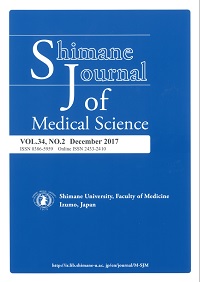Shimane University Faculty of Medicine
ISSN :0386-5959(冊子体)
ISSN :2433-2410(オンライン)


これらの論文は クリエイティブ・コモンズ 表示 - 非営利 - 改変禁止 4.0 国際 ライセンスの下に提供されています。
ダウンロード数 : ? 件
この文献の参照には次のURLをご利用ください : https://ir.lib.shimane-u.ac.jp/34591
Shimane Journal of Medical Science 8 1
1984-06-01 発行
A Comparative Study of Narcotic Anesthesia During Valvular Heart Surgery
河本 昌志
浅野 真
高崎 真弓
小坂 義弘
ファイル
内容記述(抄録等)
A retrospective study was carried out to evaluate the suitability of narcotics for valvular heart surgery. Forty patients having cardiac valvular replacement were randomly anesthetized with morphine (1,2 and 3 mg/kg) or fentanyl with low and high dose (19 and 66 μg/kg, respectively). The patients were divided into five groups according to anesthetic agent and dosage. Heart rate, direct arterial pressure and central venous pressure were always monitored serially during the procedure. Rate pressure product (RPP) was calculated to estimate the myocardial oxygen consumption. In the group given a high dose of fentanyl (HDF), circulatory stability was obtained without any change in RPP throughout the study, but in the group given a low dose of fentanyl combined with droperidol, fluctuations in hemodynamic responses were observed with reduced RPP. Serial changes in hemodynamics were apparent in groups given morphine anesthesia. It is, therefore, concluded that HDF with nitrous oxide produces minimal changes in hemodynamic responses and can be better tolerated during valvular heart surgery.
About This Article
Other Article
PP. 45 - 56
